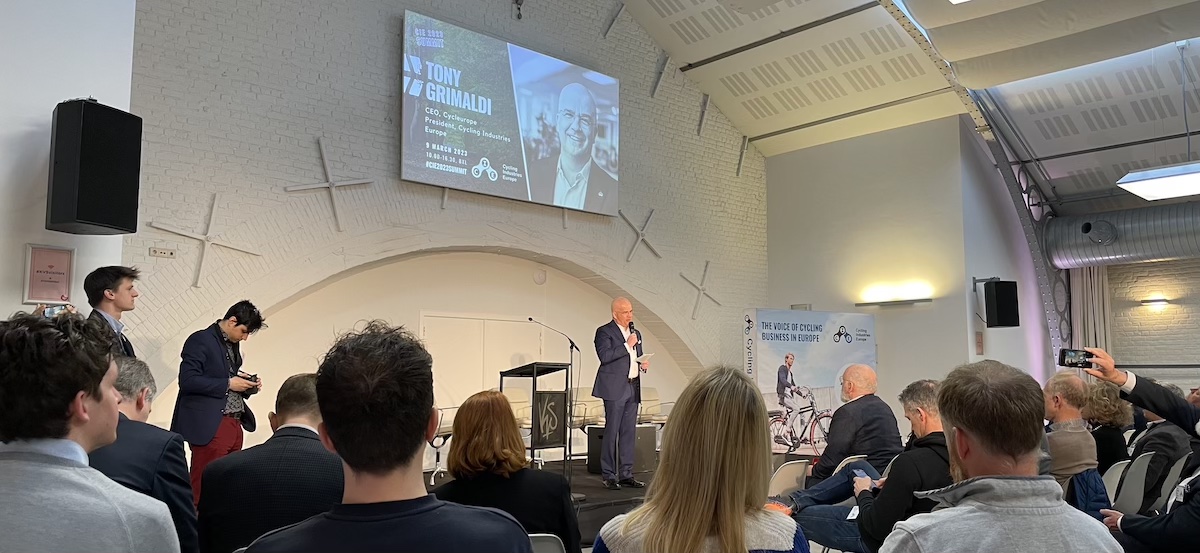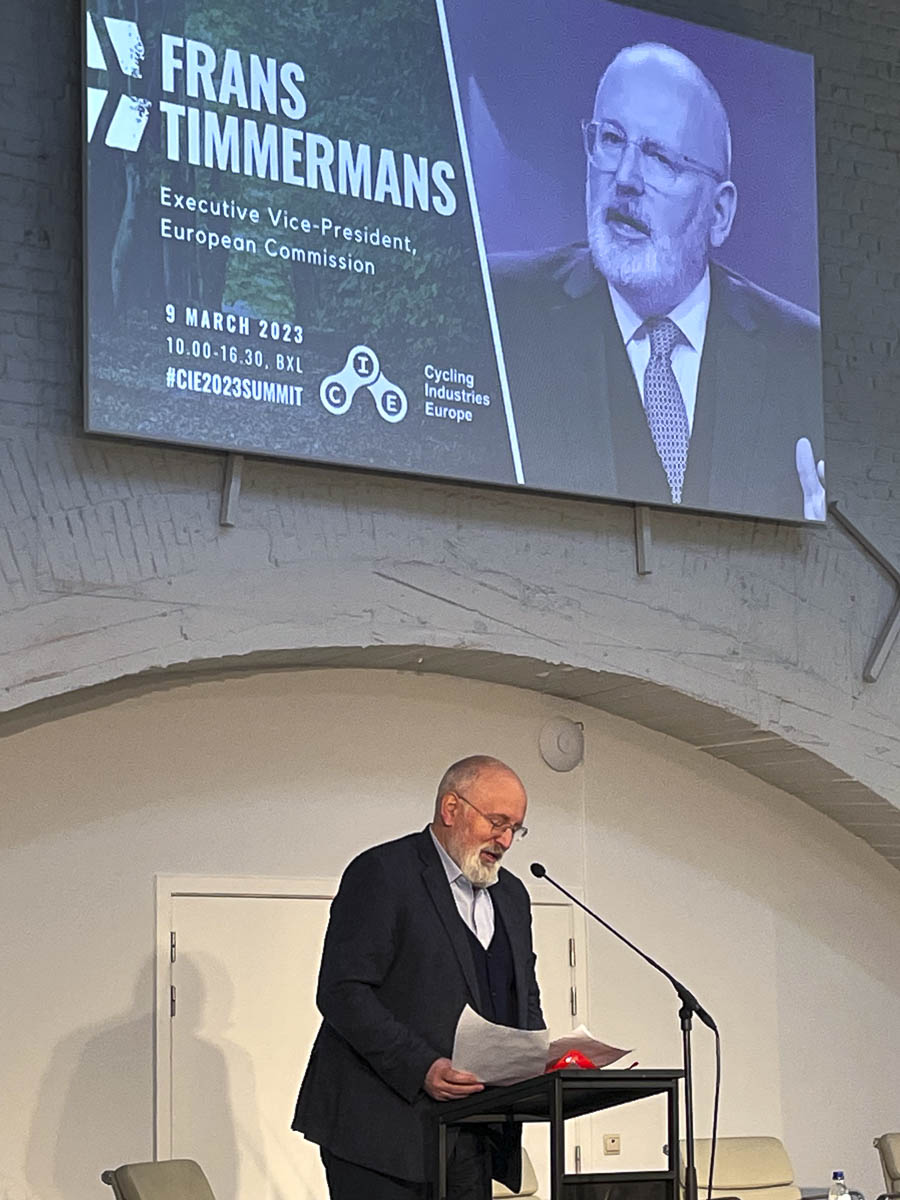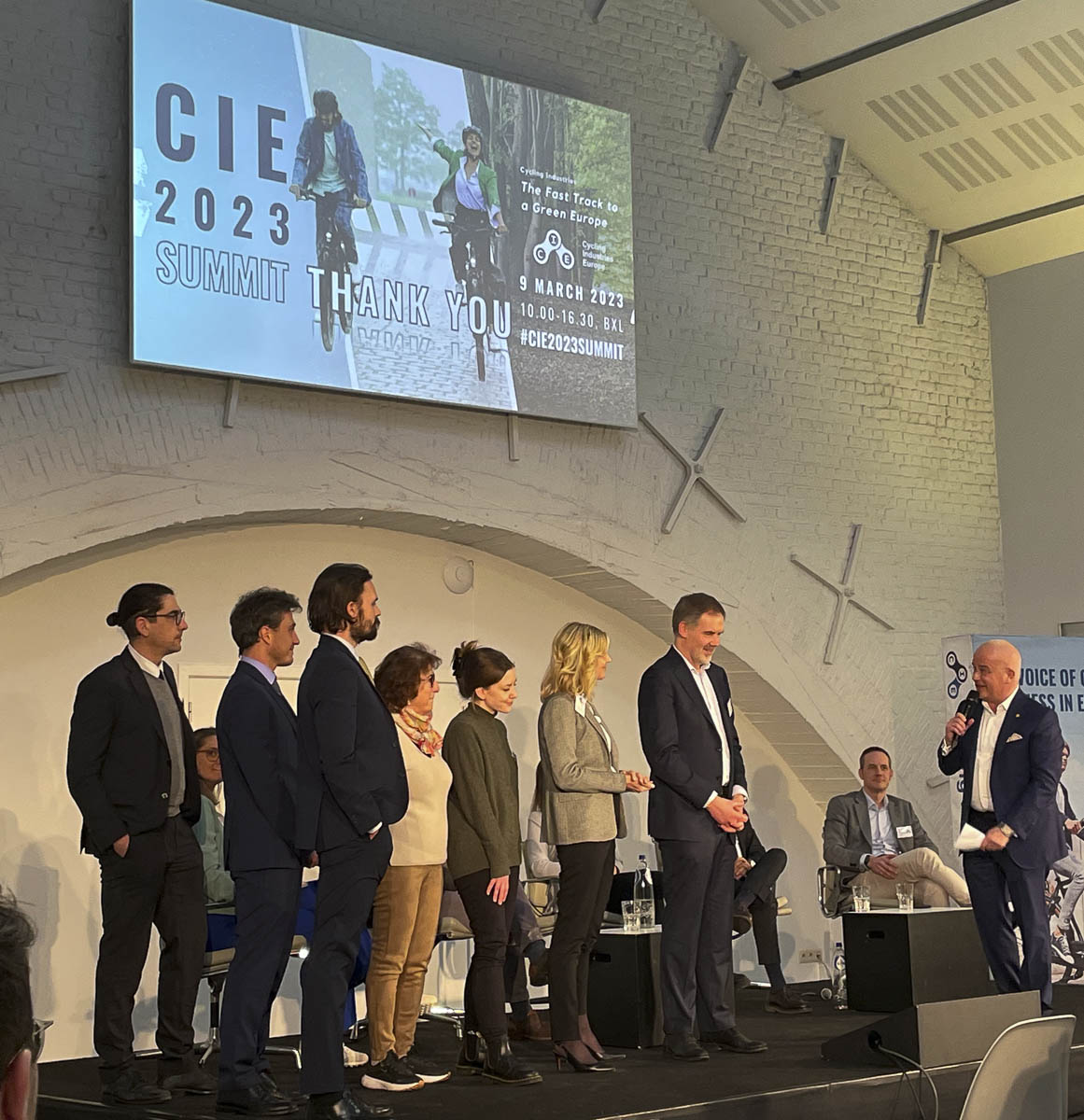On March 9th, the CIE Summit, annual assembly of the Cycling Industries Europe (CIE) association, which brings together the cycling industries in Europe, was held in Brussels.
CIE is a young association that was born a few years ago and complements the historic Conebi (Confederation of the European Bicycle Industry), founded in 1960. It aims to represent the voice of the cycling business in Europe and around the world.

Industry and politics move in the same direction at CIE Summit
Unlike other similar organizations, CIE has a cross-cutting vision of the bicycle as a catalyst for different types of activities that go beyond the production of bicycles and components, to encompass infrastructure and services related to cycling, cycle tourism, intermodal transportation, and more.
This service-oriented vision of the bicycle was at the center of the March 9th CIE summit, which saw the participation of Clorofilla’s management.
Clorofilla is finalizing its membership in CIE, which will allow the young Cesena-based brand to connect with international partners to provide products and expertise for services that are increasingly suitable for cyclists.
Cyclists are predicted to be the real protagonists in the coming years, as evidenced by the recent approval by the European Parliament of a resolution defining a Cycling Strategy for Europe, which aims to double the use of bicycles in Europe by 2030.
The CIE Summit was opened by the authoritative voice of the Vice-President of the European Union, Frans Timmermans, alongside the European Parliament member Karima Delli, responsible for the Cycling Strategy resolution, and Vice-Premier and Minister of Transport of Belgium, Georges Gilkinet.
Their speeches on behalf of the EU and member countries were very clear in defining a common direction for European policies in the coming years.

A long-sighted view from the EU
Timmermans emphasized the need to have a forward-looking perspective, quoting Dutch author Diana Vreeland:
“To stay balanced, you must move forward. You must have an unshakable faith in your bike.You must keep your eyes on the goal.”
He also noted that “the bicycle is finally recognized as a means of transport in its own right and will be the only one capable of allowing Europe to meet the commitments of the Green Deal with the reduction of carbon dioxide emissions, the improvement of air quality, and so on.”
In addition to the environmental benefits, the bicycle will also have a significant social impact, with the creation of new jobs (one million expected by 2030), the decongestion of cities, and the impact on people’s health, economic savings for citizens and the planet, and more.
Timmermans observed that the mentality of younger generations is ready to embrace this change, and that the bicycle has become the fastest means of transportation for daily commutes, particularly in cities like Brussels.
However, there is still much to be done to make cycling safer, starting with the realisation of infrastructures and implementation of services.

Frans Timmermans has announced the approval of a European Cycling Declaration
In his speech at the CIE Summit, Timmermans added an important piece to the policies supporting the cycling sector, anticipating the approval in the coming months of a European Cycling Declaration.
The document will contain the principles and objectives of the changes that will need to be made in the coming years, as well as the details of the actions and tools that Europe, and consequently the Member States, will implement to achieve these goals. This includes concrete financing methods and defining the proportions of interventions to be implemented, such as doubling the available cycling infrastructure.
Schools, shopping centers, and private buildings will, for example, need to include bicycle services, and the Declaration will ensure that wherever it is possible to introduce a strategy to promote cycling, it will be done.
Timmermans didn’t hide a forecoming sesason of discomfort for everyone as an inevitable consequence of a great change in our habits. In this regard his speech at CIE Summit sounded like a call to action for everyone.
Karima Delli: no more chitchat but concrete actions
French European deputy Karima Delli reiterated the importance of the bicycle as a means of transportation and stated that we have entered a historical moment in which we can no longer afford to waste time on discussions but must act quickly for change.
With a pragmatic view of the issue, she emphasized how environmental and social issues go hand in hand with economic issues, as in the future it will be increasingly important to convert jobs to sustainable and growing sectors.
Her motto was: “When it’s good for the climate it’s good for the job.”
The intervention of Belgian Vice-Premier and Minister of Transport Georges Gilkinet followed closely, for whom the bicycle is “the fastest way to happiness” and the best way to connect with the world.
As a passionate cyclist, Gilkinet has provenhow the approach to cycling can change and can acquire relevance and importance at various levels.
In Belgium, Gilkinet has transformed cycling into a federal competency, exactly as it happens for means of transportation such as trains and planes, through the BE Cyclist project.
The project is the result of work carried out in close contact with other ministries (economy, justice, etc.) that will allow many more people to cycle in Belgium thanks to concrete measures.
These include, for example, kilometre incentives for bike-to-work granted at the state level, more bike spaces available on all trains, and harsher penalties for bike theft.
These concrete actions, previously only implemented locally, must be transformed into regional and then federal initiatives through what Gilkinet has defined as the European Bike Revolution.

The goal according to Kevin Mayne is to create a European cycling ecosystem
“Business as usual will not create a sustainable, safe, and reliable European mobility ecosystem. We have demonstrated that cycling can double, and we have more potential to create jobs than any other mobility sector,” said Kevin Mayne, CEO of Cycling Industries Europe, in his powerful statement following Minister Gilkinet’s speech.
Mayne recognized the importance of political interventions as a crucial milestone and necessary endorsement for the cycling industry, which is now called upon to produce the expected result.
According to Mayne, we are no longer at the point where politicians recognize the importance of cycling but postpone addressing it because of more urgent issues.
The bike has finally become a priority for them too.
This idea must be spread as the goal is to bring more people on bikes, more women, more seniors, more children, providing more parking, more bike paths and more bicycles. Bikes must become cheaper, including electric ones, which will allow more people to access the use of two wheels.
For Mayne, the path ahead is still to be traveled, but the goal must be to create a European cycling ecosystem. It is a “hard, difficult, and significant” task, deserving dedication and conviction.
A world of connected and sustainable services
The rest of the day at CIE Summit confirmed the maturity of the cycling system in Europe, with the intervention of numerous members who defined a unitary vision in which the concepts of connectivity, sustainability, and trust prevail.
According to Anna Buchmann of Noca Mobility, we are going through an exciting moment where we have moved from a general intent of collaboration to a clear vision of how this collaboration can be expressed in the exchange of data and information among companies.
She also observed how sustainability issues must be addressed in detail, without hiding behind the nature of the bike as a green object.
Supply chains must be verified, suppliers must be verified, materials must be verified, and everything that can guarantee a healthy and transparent industry.
Raymond Gente of the PON group reiterated the importance of seizing the moment to demonstrate the reliability of the industrial system and confirm its ability to interact with political forces to produce the expected results.
The convergence of economic and political visions is, in fact, of fundamental importance, but there is still a problem of trust, so the industry must be able to justify the investment of the political part in the cycling world.

Collaboration and development
The impression taken from the CIE Summit on March 9th is undoubtedly that of a decisive moment for the world of cycling.
In a few years, it will be evident whether the desired turning point by politics and economic actors will be really possible.
Our feeling is that the levels of trust and competence are high, and above all, there is a (rare) sense of collaboration among different entities working towards a common goal, also thanks to the work of the CIE.
Clorofilla also understands the importance of this networking that fits into the perspective of a different economic growth not only looking to immediate profit but considering the social role that each operator plays in the current context.
This has always been the philosophy of Buratti Meccanica, and with the intervention in a strategic sector for change such as cycling through its Clorofilla brand, the company aims to make it at the heart of its mission.